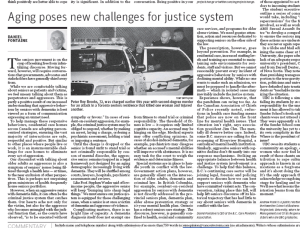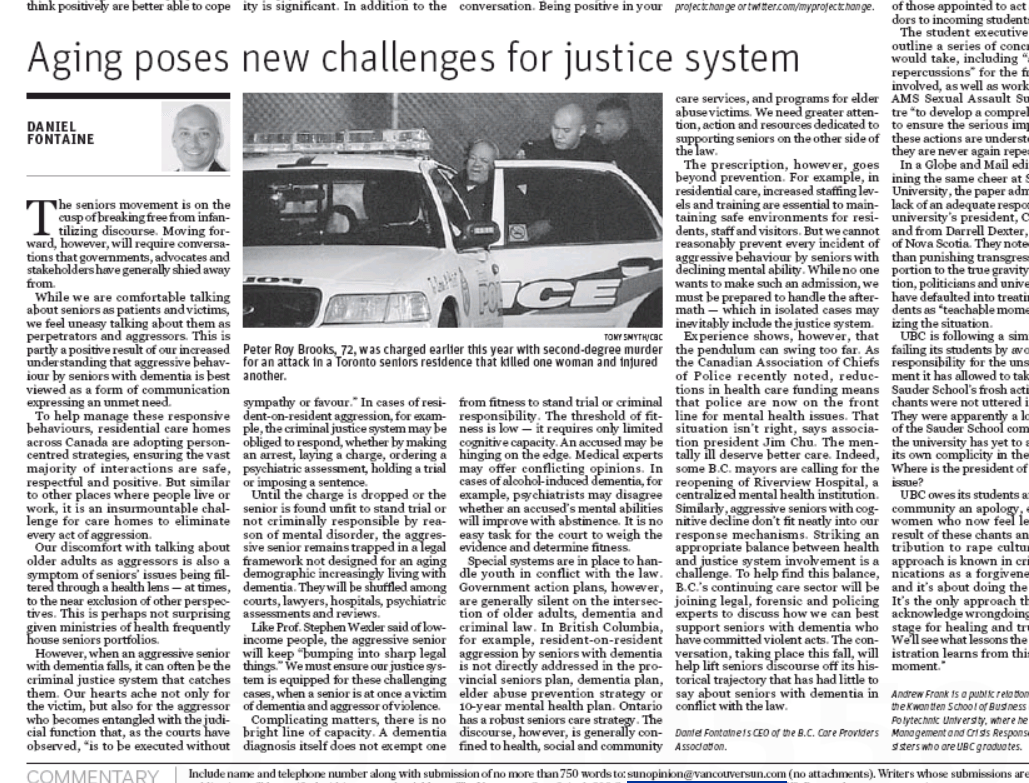The Vancouver Sun published the following opinion piece today regarding the topic of resident-on-resident aggression, dementia and the criminal justice system. It is by Daniel Fontaine, CEO for the BC Care Providers Association.
***
The seniors movement is on the cusp of breaking free from infantilizing discourse. Moving forward, however, will require conversations that governments, advocates and stakeholders have generally shied away from.
While we are comfortable talking about seniors as patients and victims, we feel uneasy talking about them as perpetrators and aggressors. This is partly a positive result of our increased understanding that aggressive behaviour by seniors with dementia is best viewed as a form of communication expressing an unmet need.

To help manage these responsive behaviours, residential care homes across Canada are adopting person-centred strategies, ensuring the vast majority of interactions are safe, respectful and positive. But similar to other places where people live or work, it is an insurmountable challenge for care homes to eliminate every act of aggression.
Our discomfort with talking about older adults as aggressors is also a symptom of seniors’ issues being filtered through a health lens — at times, to the near exclusion of other perspectives. This is perhaps not surprising given ministries of health frequently house seniors portfolios.
However, when an aggressive senior with dementia falls, it can often be the criminal justice system that catches them. Our hearts ache not only for the victim, but also for the aggressor who becomes entangled with the judicial function that, as the courts have observed, “is to be executed without sympathy or favour.” In cases of resident-on-resident aggression, for example, the criminal justice system may be obliged to respond, whether by making an arrest, laying a charge, ordering a psychiatric assessment, holding a trial or imposing a sentence.
Until the charge is dropped or the senior is found unfit to stand trial or not criminally responsible by reason of mental disorder, the aggressive senior remains trapped in a legal framework not designed for an aging demographic increasingly living with dementia. They will be shuffled among courts, lawyers, hospitals, psychiatric assessments and reviews.
Like Prof. Stephen Wexler said of low-income people, the aggressive senior will keep “bumping into sharp legal things.” We must ensure our justice system is equipped for these challenging cases, when a senior is at once a victim of dementia and aggressor of violence.
Complicating matters, there is no bright line of capacity. A dementia diagnosis itself does not exempt one from fitness to stand trial or criminal responsibility. The threshold of fitness is low — it requires only limited cognitive capacity. An accused may be hinging on the edge. Medical experts may offer conflicting opinions. In cases of alcohol-induced dementia, for example, psychiatrists may disagree whether an accused’s mental abilities will improve with abstinence. It is no easy task for the court to weigh the evidence and determine fitness.
 Special systems are in place to handle youth in conflict with the law. Government action plans, however, are generally silent on the intersection of older adults, dementia and criminal law. In British Columbia, for example, resident-on-resident aggression by seniors with dementia is not directly addressed in the provincial seniors plan, dementia plan, elder abuse prevention strategy or 10-year mental health plan. Ontario has a robust seniors care strategy. The discourse, however, is generally confined to health, social and community care services, and programs for elder abuse victims. We need greater attention, action and resources dedicated to supporting seniors on the other side of the law.
Special systems are in place to handle youth in conflict with the law. Government action plans, however, are generally silent on the intersection of older adults, dementia and criminal law. In British Columbia, for example, resident-on-resident aggression by seniors with dementia is not directly addressed in the provincial seniors plan, dementia plan, elder abuse prevention strategy or 10-year mental health plan. Ontario has a robust seniors care strategy. The discourse, however, is generally confined to health, social and community care services, and programs for elder abuse victims. We need greater attention, action and resources dedicated to supporting seniors on the other side of the law.
The prescription, however, goes beyond prevention. For example, in residential care, increased staffing levels and training are essential to maintaining safe environments for residents, staff and visitors. But we cannot reasonably prevent every incident of aggressive behaviour by seniors with declining mental ability. While no one wants to make such an admission, we must be prepared to handle the aftermath — which in isolated cases may inevitably include the justice system.
Experience shows, however, that the pendulum can swing too far. As the Canadian Association of Chiefs of Police recently noted, reductions in health care funding means that police are now on the front line for mental health issues. That situation isn’t right, says association president Jim Chu. The mentally ill deserve better care. Indeed, some B.C. mayors are calling for the reopening of Riverview Hospital, a centralized mental health institution. Similarly, aggressive seniors with cognitive decline don’t fit neatly into our response mechanisms. Striking an appropriate balance between health and justice system involvement is a challenge. To help find this balance, B.C.’s continuing care sector will be joining legal, forensic and policing experts to discuss how we can best support seniors with dementia who have committed violent acts. The conversation, taking place this fall, will help lift seniors discourse off its historical trajectory that has had little to say about seniors with dementia in conflict with the law.
Daniel Fontaine is CEO of the B.C. Care Providers Association.
***
Care to Chat
The BCCPA inaugural Care to Chat speaker session is at 12:00 p.m. on Nov. 7, 2013 at the Terminal City Club in downtown Vancouver. The topic is Resident-on-Resident Abuse in Long Term Care: When Your Loved One is the Aggressor. The Hon. Suzanne Anton, QC, Minister of Justice and Attorney General, will deliver opening remarks. CBC’s Rick Cluff will moderate the expert panel. Learn more.





